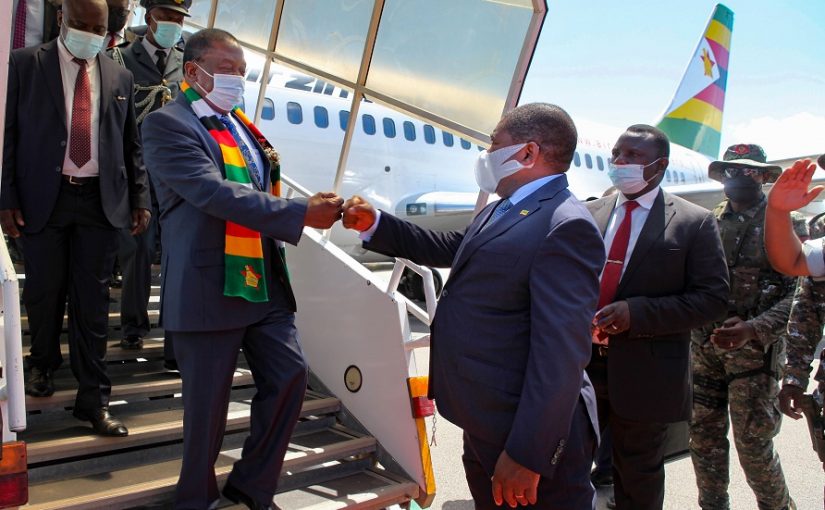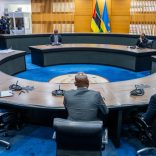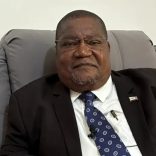Tanzania affirms to broaden bilateral ties with Mozambique
Mozambique: Zimbabwe is ‘natural ally’ in new investment projects – president

Photo: Luisa Nhantumbo / Lusa
Zimbabwe is a “natural ally” of Mozambique in new projects, Mozambican President Filipe Nyusi said on Friday, after talks behind closed doors with the head of state of that country, Emmerson Mnangagwa.
“Collective management with Zimbabwe is inevitable, it is a natural ally,” Nyusi said, regarding a joint water resources management venture, but suggesting proximity in relation to other new projects the two countries have under discussion.
“The bilateral relationship with Zimbabwe ends up being one of brotherhood, even,” he said – the two countries share a long stretch of border and an economic corridor linking Harare to the port of Beira, central to Zimbabwean foreign trade.
Emmerson Mnangagwa made a one-day visit to Mozambique, with a stay in the city of Beira, where along with Filipe Nyusi he inaugurated a number of locomotives and carriages supplied by India, part of which will link the two countries.
The ceremony included calls from both sides for businesspeople from both sides of the border to be involved in joint investments, taking advantage of the transport corridor that runs from the port of Beira to the border at Machipanda and then on to Harare, creating “synergies” that “improve the business environment,” Nyusi said.
Questioned by Lusa about what other investments could bring the two countries together, the Mozambican president gave some examples.
Firstly in the area of energy – in which Mozambique already supplies Zimbabwe through the Cahora Bassa dam -, considering that the neighbouring country is “a safe market,” as well as others from the Southern African Development Community (SADC).
There are also studies for partnerships in agriculture, given Zimbabwe’s “known experience” in the area, and projects under analysis in the sector of water resource management – such as the Zambezi river that crosses the two countries, the source for Cahora Bassa, Mozambique’s main hydroelectric dam.
“In our country water kills, because it rains a lot and there are floods” or because in other places it does not exist in quantity, Nyusi said.
The two countries share water resources and that is the most visible face of how the Mozambican President sees the neighbouring country as a “natural ally”.
In line with his ambitions for agriculture and food self-sufficiency, Nyusi also gave the example of a fertiliser factory in Mozambique that could be operated and managed jointly – considering that financiers of this type of project “more readily accept integrated investments,” in this case, bringing the two countries together.
As well as new projects, the rehabilitation of transport conditions along the Beira-Machipanda corridor has been a priority, as illustrated today with the inauguration of four locomotives by the two heads of state.
At the Beira railway station, Nyusi returned for a morning to the public company he managed before entering government duties.
“Mozambique must respond with quality and efficiency” to the logistical needs of landlocked countries, Filipe Nyusi noted, noting the important role that the country also has for Malawi, Zambia and part of South Africa, with the possibility of also serving the Democratic Republic of Congo (DRCongo).
It is a sign of “development, modernisation,” the Zimbabwean head of state said at the ceremony, “a shared vision for the region,” he added, praising relations with India, which supplied the railroad equipment.
Mnangagwa included India in a batch of countries – mentioning Brazil, China and Russia – that give concessional credits without political counterparts, demanded by others and from which Zimbabwe shies away, he said.
The Mozambican president also sent a greeting through diplomatic channels to Narendra Modi, the Indian prime minister, whom he said he hoped to meet again soon.
Filipe Nyusi called again for an end to sanctions against Zimbabwe – imposed since 2001, still during the rule of former President Robert Mugabe.
The United States and the European Union (EU) have adopted sanctions in protest against alleged political violence and human rights abuses – with the EU suspending most sanctions on Zimbabwe in 2014, but the country remains on the sidelines of international financial and trade relations.
— Presidential Communications Zimbabwe 🇿🇼 (@DeptCommsZW) February 11, 2022












Leave a Reply
Be the First to Comment!
You must be logged in to post a comment.
You must be logged in to post a comment.